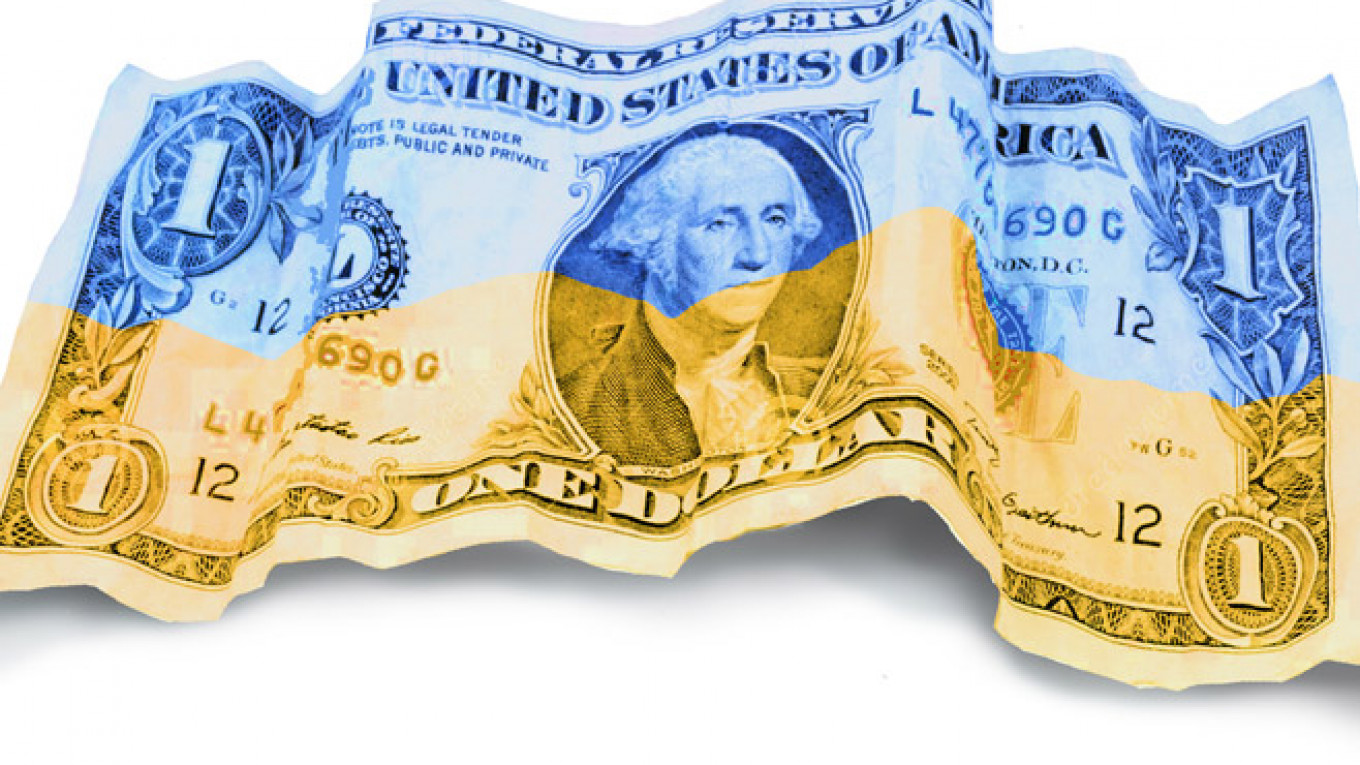While the war in Ukraine's east again threatens to explode into open conflict, Kiev is simultaneously fighting an even greater impediment to Ukraine's long-term stability: endemic corruption.
According to the most recent figures from international corruption watchdog Transparency International, Ukraine was ranked 144 out of 177 countries on its Corruption Perceptions Index, placing Ukraine at the bottom of the rankings — tied with Cameroon, Papua New Guinea, Nigeria and others.
While Ukrainian government graft is widespread, public procurement corruption tops the list of challenges that the government in Kiev must confront. Ukrainian Prime Minister Arseniy Yatsenyuk has stated that Ukraine's government makes about $25 billion in purchases in state purchases yearly, 40 percent of which — or $10 billion — is lost through graft.
"Public procurement is the most problematic sector where corruption is rife. Sometimes for certain things, the level of corruption in a tender can be up to 40 to 50 percent," said Sergiy Gula, a government procurement expert at Transparency International Ukraine.
"The most common type of corruption in government tenders is either unlawful use of a single party or an associated company — a fictional competition or tender is won by a predetermined firm, even with the worst and most expensive proposal," Gula said.
Corruption in the purchase of drugs for HIV/AIDs uncovered by the Anti-Corruption Action Center in Kiev supports Gula's point. In a typical scheme, several companies controlled by one owner "compete" with each other to win millions of public funds. The end result of drug corruption procurement is that only 43 percent of HIV-infected patients obtain the drugs they need.
Another recent example of associated party procurement was the 2011 purchase by state-owned energy company Naftogaz of an offshore drilling rig for $400 million — a rig sold everywhere else on the world market for $250 million. In the Naftogaz case, the only two bidders — Highway Investment Processing LLP and Falcona Systems Ltd — were both nominally owned by two Latvian citizens.
What should Kiev do to clean up Ukrainian government procurement? A recent law passed by Ukraine's parliament creating an anti-corruption agency is a start. The law requires all Ukrainian public officials to file public declarations of their incomes and assets, which could help ferret out government employees who have benefited from procurement corruption schemes.
Although this new law is a successful step toward reform, Ukraine should implement further measures that specifically target public procurement corruption. According to Alexandra Ustinova of the Anti-Corruption Action Center, purchasing by state enterprises remains very opaque, as 90 percent of state companies still do not provide any public information on their procurements, ensuring that the process remains wide open to graft.
To increase public procurement transparency, Ukraine's new government could imitate Chile. In 2003, the Chilean government created ChileCompra, an e-commerce platform that places all government procurement information such as tenders, awards, bidding processes, and rules and regulations in a single online portal.
According to a study from the United Nations Development Program, the creation of ChileCompra has dramatically increased transparency in government procurement by ensuring that all government purchases remain arms-length transactions between buyers and sellers, thereby reducing the opportunities for corruption. Ukraine should implement its own version of ChileCompra and ensure it includes both state enterprises as well as government agencies.
Given the scale of procurement corruption in Ukraine, however, Kiev should take one more step even beyond creating a Ukrainian version of ChileCompra. Ukraine should take the radical step of outsourcing the procurement by any central government or state-owned companies of all goods and services worth more than $100,000.
An NGO, which we'll call — for the sake of argument — the Ukrainian Procurement Authority could be established. The Procurement Authority would reside entirely outside any Ukrainian government ministry and be composed of nongovernment employees. Any tender or purchase of good and services above $100,000 by any government entity would be overseen by the outside Procurement Authority.
Here's an example of how this could work. Naftogaz needs million of dollars worth of new gas pipeline equipment. Rather than leaving the tender specifications to be drawn up entirely by Naftogaz staff, Procurement Authority employees would first need to sign off on all of the language in the tender to ensure that it is not designed — or "scoped" to use typical procurement language — to favor one bidder.
Once all bids are received, Procurement Authority staff would oversee the evaluation committee to select the winning bidder. Although the evaluation committee's decision would be determined by majority vote, a Procurement Authority employee would need to provide final approval of the committee's decision — in affect giving this person a veto over any decision made by Naftogaz employees with which he or she disagreed. Finally, a contracts officer or lawyer from the Procurement Authority would need to sign off on the final contract between Naftogaz and the winning bidder.
To ensure the complete independence and incorruptibility of the new Procurement Authority, it should initially be funded in full — including staff salaries — by donors such as the International Monetary Fund, World Bank and Western governments. All staff hired would receive a minimum salary of $1,000 per month, and technical assistance would be provided by Western expatriates with expertise in government procurement from across a wide variety of economic sectors.
Based on my experience at the U.S. Agency for International Development, where I managed a portfolio of economic reform technical assistance projects in the former Soviet Union, some rough cost estimates can be made. If we assume an initial employee base of 200 Ukrainians and 20 expatriate procurement experts, the cost to fund the Procurement Authority would come to about $10 million per year.
Although Ustinova noted that Ukrainian legislation does not currently allow for the participation of NGOs such as my proposed Procurement Authority, Western donors should require this legislation to be updated as a firm condition for further aid to Ukraine. While Ukraine signed a $17 million loan agreement with the IMF last April, experts now foresee Ukraine requiring a further $19 billion in assistance in 2015, giving Western donors unprecedented leverage over Kiev.
In this context, a five-year donor commitment to underwrite the costs of the new Procurement Authority comes out to $50 million, or about 0.25 percent of the aid Kiev may need — a small price to pay if this saves Ukraine billions of dollars per year.
Does my proposal require the Ukrainian government to outsource a substantial piece of its sovereignty to a foreign-funded NGO? Absolutely, and that's the whole point. The Ukrainian state has been by far the greatest impediment to the country's success, and therefore solutions to Ukraine's problems are most likely to come from civil society organizations such as the Anti-Corruption Action Center rather than the government.
Put simply, after nearly 25 years of incompetent and predatory governance, Ukraine needs complete reform, not mere tinkering around the edges, and before making a further $19 billion commitment to Kiev — a commitment ultimately underwritten by Western taxpayers — donors should ensure that Ukraine is well and truly on the path to reform.
Josh Cohen is a former USAID project officer involved in managing economic reform projects in the former Soviet Union. He contributes to a number of foreign policy-focused media outlets and tweets at @jkc_in_dc
A Message from The Moscow Times:
Dear readers,
We are facing unprecedented challenges. Russia's Prosecutor General's Office has designated The Moscow Times as an "undesirable" organization, criminalizing our work and putting our staff at risk of prosecution. This follows our earlier unjust labeling as a "foreign agent."
These actions are direct attempts to silence independent journalism in Russia. The authorities claim our work "discredits the decisions of the Russian leadership." We see things differently: we strive to provide accurate, unbiased reporting on Russia.
We, the journalists of The Moscow Times, refuse to be silenced. But to continue our work, we need your help.
Your support, no matter how small, makes a world of difference. If you can, please support us monthly starting from just $2. It's quick to set up, and every contribution makes a significant impact.
By supporting The Moscow Times, you're defending open, independent journalism in the face of repression. Thank you for standing with us.
Remind me later.







